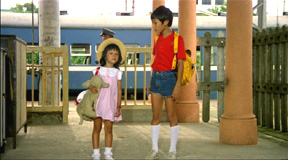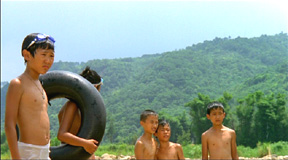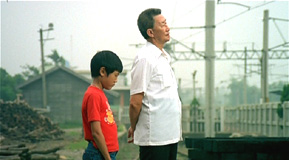A Summer at Grandpaís (Hou Hsiao-hsien) 1984
 Hou Hsiao-hsienís easygoing but heartfelt tale A
Summer at Grandpaís is astutely told from a childlike point of view
without falling into any of the pitfalls that hamper most movies with young
protagonists. Following Ting-Ting and Tung-Tung, a preteen brother and sister
who must leave Taipei to live with their grandparents in the country one summer
after their mother takes ill, the film has mature themes present, but in
presenting them it never sacrifices the innocence that the children possess.
Talk about topics like abortion and armed robbery is frequent, but itís the
scenes where the children interact with each other that seem the most exciting,
perhaps because so few films take delight in something as simple as watching
children at play. When mature themes do arise, itís usually through snippets
of overheard dialogue that the children only partly comprehend. Ting-Ting writes
letters back home to his ailing parents that express his frustration that the
motivations of the adults donít make more sense, but Hou doesnít leave the
audience in the dark. His camera lingers after then children leave, giving us
information that the children arenít privy to. Instead of using his technique
to distance his audience from the action, as he often opts to in his later
films, the directorís tone here is inclusive and warm. There are hints at the
panning, master-shot dominated style that would later come to define Houís
distinctive work, but mostly his direction is more conventional in Grandpaís.
Houís relative invisibility serves the story, however, allowing the mood,
pretty scenery, and accomplished naturalistic performances to take center stage.
Hou Hsiao-hsienís easygoing but heartfelt tale A
Summer at Grandpaís is astutely told from a childlike point of view
without falling into any of the pitfalls that hamper most movies with young
protagonists. Following Ting-Ting and Tung-Tung, a preteen brother and sister
who must leave Taipei to live with their grandparents in the country one summer
after their mother takes ill, the film has mature themes present, but in
presenting them it never sacrifices the innocence that the children possess.
Talk about topics like abortion and armed robbery is frequent, but itís the
scenes where the children interact with each other that seem the most exciting,
perhaps because so few films take delight in something as simple as watching
children at play. When mature themes do arise, itís usually through snippets
of overheard dialogue that the children only partly comprehend. Ting-Ting writes
letters back home to his ailing parents that express his frustration that the
motivations of the adults donít make more sense, but Hou doesnít leave the
audience in the dark. His camera lingers after then children leave, giving us
information that the children arenít privy to. Instead of using his technique
to distance his audience from the action, as he often opts to in his later
films, the directorís tone here is inclusive and warm. There are hints at the
panning, master-shot dominated style that would later come to define Houís
distinctive work, but mostly his direction is more conventional in Grandpaís.
Houís relative invisibility serves the story, however, allowing the mood,
pretty scenery, and accomplished naturalistic performances to take center stage.
 Although Hou never feels it necessary to burden Grandpaís
with melodramatic affectation, he still manages to convey the sense of
confused hurt that Ting-Ting and Tung-Tung feel. His attention to the nuances in
their behavior, such as the way that the boys rebuff Tung-Tung, adding to her
loneliness, tells the audience much about the hurt that the kids feel and their
inability to articulate it. What most centers the filmís point of view as a
childlike one, however, is the way that the moods that come and go are rather
superficial, even if theyíre felt intensely. These kids are sometimes
depressed, but they arenít really introspective. Their most ardent attention
is focused on whatever is happening the moment. When things go wrong for them,
everything is awful, but when the ordeal is over, their tone perks up. Lessons
are learned, but not every event in the film is a paradigm-altering one.
Including that youthful lack of an emotional attention span is perceptive and
makes the kids much more believable than they would be if Hou had chosen to give
them a more conventional, adult character arc. Few filmmakers seem as adept as
Hou is here at showing both the complexities of being a child stuck in an adult
world and the childhood pleasures of being able to totally isolate oneself from
that world with blithe insularity.
Although Hou never feels it necessary to burden Grandpaís
with melodramatic affectation, he still manages to convey the sense of
confused hurt that Ting-Ting and Tung-Tung feel. His attention to the nuances in
their behavior, such as the way that the boys rebuff Tung-Tung, adding to her
loneliness, tells the audience much about the hurt that the kids feel and their
inability to articulate it. What most centers the filmís point of view as a
childlike one, however, is the way that the moods that come and go are rather
superficial, even if theyíre felt intensely. These kids are sometimes
depressed, but they arenít really introspective. Their most ardent attention
is focused on whatever is happening the moment. When things go wrong for them,
everything is awful, but when the ordeal is over, their tone perks up. Lessons
are learned, but not every event in the film is a paradigm-altering one.
Including that youthful lack of an emotional attention span is perceptive and
makes the kids much more believable than they would be if Hou had chosen to give
them a more conventional, adult character arc. Few filmmakers seem as adept as
Hou is here at showing both the complexities of being a child stuck in an adult
world and the childhood pleasures of being able to totally isolate oneself from
that world with blithe insularity.
 Perhaps itís because their stories are being told in such
close proximity to a childís point of view, but some of the adults in A
Summer at Grandpaís seem to act with the same sort of short-temperedness
and poor judgment that is usually associated with kids. Hou points out that
parental concerns donít stop once a child reaches adulthood in a subplot that
deals with Ting-Tingís irresponsible uncle. Heís shown sneaking around
behind his fatherís back, acting without considering consequence, and talking
to Ting-Ting more casually than any other adult character. His tendency toward
rash behavior, especially when contrasted with Grandpaís tendency toward the
opposite, suggests that maturity isnít something that automatically arrives
with adulthood, but instead something that is present in some adult actions, but
not others. That Grandpa himself even lapses into a petulant fit or two is
indicative of Houís fundamentally humane unwillingness to present any
unassailable model for behavior. The introduction of Tung-Tungís makeshift
maternal figure, a wandering retarded woman, only further explores this belief
that childlike moments exist in all adults, and itís that theme that most ably
justifies the filmís point of view in a film intended for adult audiences. A
Summer at Grandpaís sees the moments where Ting-Ting steps up to adult
understanding as actions that are just as thoughtfully considered as the ones
where the adults resolve their problems, and similarly suggests that their
lapses of maturity are equitable.
Perhaps itís because their stories are being told in such
close proximity to a childís point of view, but some of the adults in A
Summer at Grandpaís seem to act with the same sort of short-temperedness
and poor judgment that is usually associated with kids. Hou points out that
parental concerns donít stop once a child reaches adulthood in a subplot that
deals with Ting-Tingís irresponsible uncle. Heís shown sneaking around
behind his fatherís back, acting without considering consequence, and talking
to Ting-Ting more casually than any other adult character. His tendency toward
rash behavior, especially when contrasted with Grandpaís tendency toward the
opposite, suggests that maturity isnít something that automatically arrives
with adulthood, but instead something that is present in some adult actions, but
not others. That Grandpa himself even lapses into a petulant fit or two is
indicative of Houís fundamentally humane unwillingness to present any
unassailable model for behavior. The introduction of Tung-Tungís makeshift
maternal figure, a wandering retarded woman, only further explores this belief
that childlike moments exist in all adults, and itís that theme that most ably
justifies the filmís point of view in a film intended for adult audiences. A
Summer at Grandpaís sees the moments where Ting-Ting steps up to adult
understanding as actions that are just as thoughtfully considered as the ones
where the adults resolve their problems, and similarly suggests that their
lapses of maturity are equitable.
* * * *
11-21-02
Jeremy Heilman